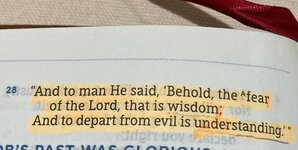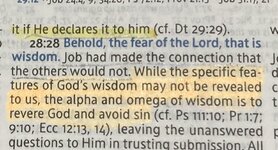Job 26 & 27
1 Then Job answered and said, 2 “What a help you are to the one without power! How you have saved the arm without strength! 3 What counsel you have given to one without wisdom! What sound wisdom you have abundantly made known! 4 To whom have you declared words? And whose breath comes out from you?
Job replies to Bildad with sarcasm. There's something of note in verse 4. The Hebrew word for breath can also mean spirit. The word is the same and the meaning is interchangeble. The Spirit of God may also be referred to as the Breath of God. The words that you speak are carried out by your breath. The ancients understood that there are spirits behind your words, which is what Job is getting at in verse 4. Job is asking, 'by who's spirit are you speaking?'
Paul picks up on this principle in the New Testament, in 1 Corinthians 12, when he says that "no one can say 'Jesus is Lord' except by the Holy Spirit." When you reecho God's words, believe and say the things He says, you are doing so by the operation of the Holy Spirit. Paul speaks to the flip side of this as well: "no one speaking by the Spirit of God says that Jesus is accursed." Anyone who denies the Lordship of Christ and commits idolatry does so by the spirit of antichrist.
The Apostle John also says, "Don't believe every spirit but test the spirits to see if they are from God, because many false prophets have gone out into the world. Every spirit that confesses Jesus Christ has come in the flesh is from God. Every spirit that does not confess Jesus is not from God, but the spirit of antichrist, which is coming and already in the world."
People espouse doctrines and say things that reveal by who's spirit they're speaking. When I hear people say to take pride in sodomy, I know that they are speaking by the spirit of Satan. When they say that they do not deserve God's justice, that they deserve heaven, that they don't need God to save them, when they exalt themselves, they follow in the footsteps of their father the devil and speak by his spirit.
11 The pillars of heaven tremble And are astonished at His rebuke. 12 He quieted the sea with His power, And by His understanding He crushed Rahab.
The ancients understood the sea as emblematic of chaos itself. No man can tame it, but God can. God can bring order to the chaos, and He can bring chaos to order. Think of Christ calming the sea by His rebuke and think of God flooding the world when they had established a murderous order. Rahab does not refer to the woman in Jericho from Joshua. Remember that Job takes place long before that. It is a monster/fallen angel, just like Leviathan, which Job will get into later.
3 For as long as breath is in me, And the spirit from God is in my nostrils, 4 My lips certainly will not speak unrighteousness, Nor will my tongue utter deceit. 5 Far be it from me that I should declare you right; Till I breathe my last I will not remove my integrity from me. 6 I hold fast my righteousness and will not let it go. My heart does not reproach any of my days.
Job maintains his case that he is justified and innocent. You too maintain your righteousness, not that you never have done anything wrong, but that Christ did everything right in your place.




